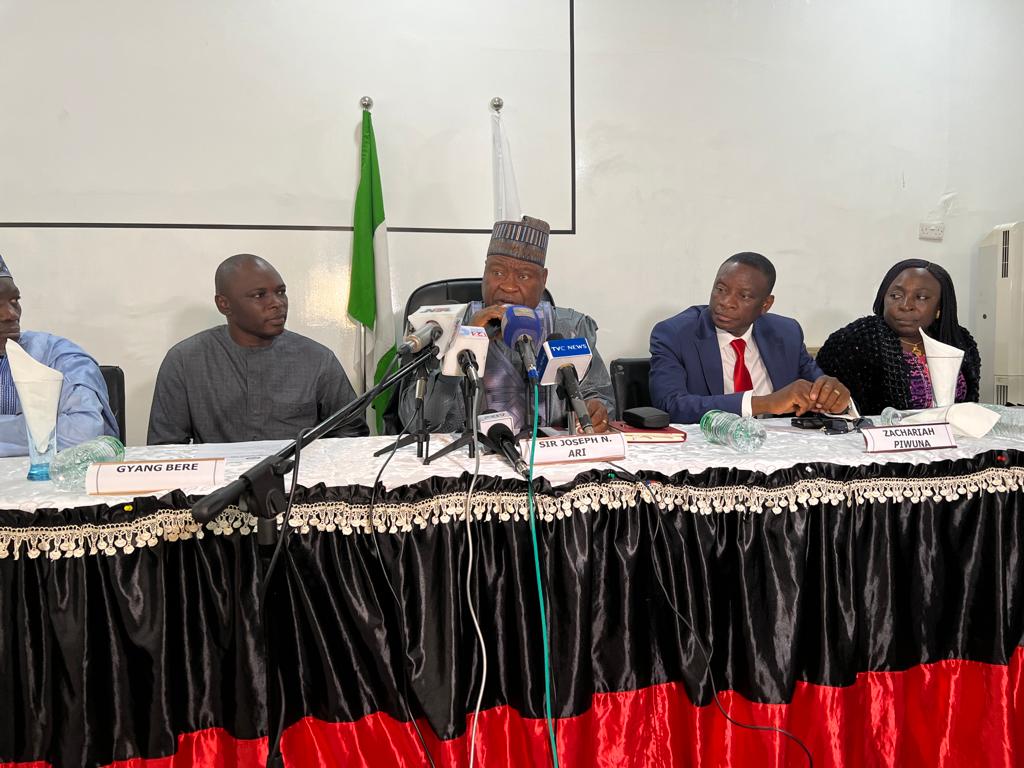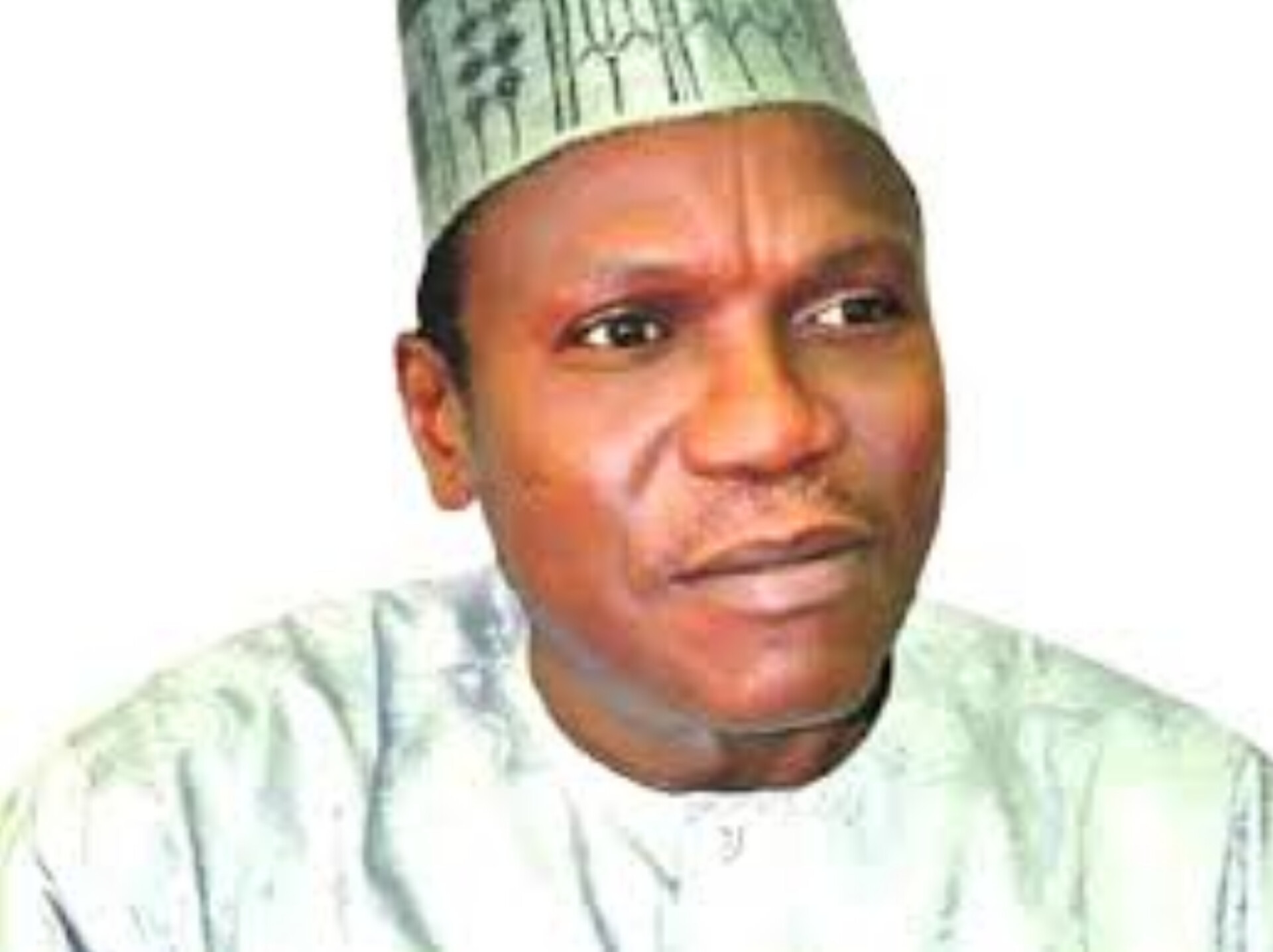Empowerment
ITF showcases 2022 – 2025 Strategic Policy Direction

The Industrial Training Fund formally has unveiled its strategic policy direction for 2022 – 2025.
This was contained in a statement issued in Abuja on Sunday by the Director-general/Chief Executive of the Industrial Training Fund, Sir Joseph Ari, during a media briefing in Jos.
According to the ITF Boss the Strategic Policy Direction is the third of such plans by the incumbent administration in the Industrial Training Fund (ITF).
It will be recall that on assumption of office in 2016, the administration unveiled the ITF Reviewed Vision: Strategies for Mandate Actualisation.
“The plan, which was initially slated to terminate in 2022, was, however, reviewed in 2020 to address gaps that were identified in the course of its implementation, and for us to appropriately respond to the negative impact of the COVID-19 Pandemic on our numerous clients.”
He reiterated that,
”While it lasted, the plan enabled the ITF to aggressively address service challenges by computerizing our operations, tackling infrastructural challenges to expand access to Nigerians desirous of acquiring skills, and generally address a gamut of other strictures that were impinging on our ability to effectively discharge our mandate for National economic growth and development and the general good of the Nigerian people.”
He however, lamented that, “Despite the numerous achievements recorded by the Fund on account of these initiatives, we have realized that more needs to be done if we must fully tackle the numerous socio-economic problems that are bedevilling us as a Nation.”
He further stated that, “given the nature of your profession, you should be acutely aware that unemployment in Nigeria today is at over 33% as over 23 million Nigerians that are desirous to work cannot find jobs, mostly because of the absence of requisite skills.
“Poverty is equally on the rise with some estimates placing the number of Nigerians that are living in poverty to be over 90 million. In the face of all these, our population has continued to soar with the World Bank estimating that Nigeria might hit 216 million by the end of this year.
“Equally worrisome is the spectre of the Out of School Children, which according to the United Nations Children Fund (UNICEF) is projected to be over 18.5 million.”
“It is based on the above and in line with our mandate of Developing a vast pool of skilled manpower sufficient to meet the needs of the public and private sectors of the national economy coupled with resolutions at the recently concluded ITF National Skills Summit in Abuja that we found it imperative to review and refocus our strategies to address the above challenges and to meet the skills requirement of the nation in line with global best practices.
“In arriving at our strategies, we considered the need to scale up our activities to address the soaring unemployment and other socio-economic challenges by leveraging on our three Es (Experience, Expertise and Expansive network), deployment of technology for wider coverage and more flexible service delivery.”, Ari explained.
The new policy framework, which has as its theme: Re-Engineering Skills for Sustainable Development according to Ari, has external and internal components;
The ITF Boss further said that, “The internal components of the plan, which entail value reorientation, Industrial Development, Commercialization of ITF Facilities, Alternative Funding Window, Deployment and Promotion, Annual Budget Preparation and, Revenue Generation are intended to drive the external components of the new policy direction, which covers Standardization and Certification, Technical and Vocational Skills Training Programmes, Skills Intervention Programmes, Electronic and Virtual Learning and, Optimal Utilization of Skills Training Centres (STCs) and Vocational Wings (VWs). ”
According to him, he further revealed that, ”Standardization and Certification as the core aspects of the Mandate of the Industrial Training Fund, specifically, Section 2 subsections c and d of the ITF Act 2011, vest the ITF with the responsibility to set training standards in all sectors of the economy and monitor adherence; and evaluate and certify vocational skills acquired by apprentices, craftsmen and technicians in collaboration with relevant organisations.
In this area, the Fund will focus on ensuring full adherence to standards and regulating vocational skills training outfits through the accreditation of skills training centres and certification of all skills training in line with the Act.”
To actualise this, he said that, “the Fund will develop National Occupational Standards (NOS); Evaluate and certify apprentices, technicians and craftsmen; Train and certify learning and development professionals and; Create and maintain a data bank on skills training.”
Another key area of the Fund’s mandate, the ITF Boss said, “is the Technical and Vocational Skills programmes.
”Despite our commendable achievements in this regard, the Fund is set to refocus Technical and Vocational Skills Training for employability and economic growth by facilitating the institutionalization of the National Apprenticeship and Traineeship System (NATS).
”To actualize this, the Fund will collaborate with relevant public and private stakeholders for NATS; appraise and harmonize Apprenticeship programmes in line with set guidelines; conduct monitoring and evaluation and; design and develop technical and vocational skills programmes in line with the needs of the economy.
Saying that, “When fully in place, our plan will ensure a pool of highly skilled indigenous apprentices, technicians and craftsmen as well as an institutionalized National Apprenticeship and Traineeship System (NATS). ”
”Cognisant of the fact that technical skills are integral to the growth and development of societies across the globe, the incumbent management since its assumption of office in 2016, has been committed to equipping Nigerians with technical and vocational skills for employability and entrepreneurship.
”In this regard, to further address the problems of rising unemployment and under-employment, the Fund is re-engineering its skills intervention programmes through National Apprenticeship and Traineeship System (NATS).
”To achieve this, the Fund will register as a super certification centre; extend the duration of skills intervention programmes in line with NATS (six months for traineeship and one year for apprenticeship); procure and provide start-up packs for trainees in the succeeding year; design and develop skills intervention programmes; identify and engage accredited Skills Training Centres and certified craftsmen; implement, monitor and follow up intervention programmes and; evaluate and certify trainees.
“The intended outcome of this strategy is to have at least a total of 27,000 skilled and employable youths (18,000 trained youths under the NATS and 9,000 youth under the NISDP and other intervention programmes) and increased SMEs and Entrepreneurs to meet the Nation’s economic needs.”
“In this area, the Fund will provide the enabling environment to foster creativity, innovation, entrepreneurship and employability through its skills training centres by:
“Upgrading three of its skills training centres to Centres for Advanced Skills Training for Employment (CASTE)
“Embedding production Hubs, Skills/e-Hubs as well as creative and innovative hubs in its Skills training Centres and Vocational wings and,
“Utilizing existing skills training Centres to develop the capacity of technical instructors.
“In this regard, the Fund will equip Training Centres with state-of-the-art facilities, partner with relevant stakeholders for training placement as well as identify the competitive advantage of the centres for production purposes. We will also introduce instructors’ training in three (3) designated Skills Training Centres, advertise and deploy the Centre’s facilities and equipment for commercial use, engage trainees in the design and development of products and establish creative and innovative clinics. In addition, it will develop entrepreneurs and rename all Industrial Skills Training Centres as ITF Skills Training Centres (ITF STCs).
“With this strategy, we will now have three (3) Centres for Advanced Skills Training for Employment (CASTE) in Lagos, Kano and Jos as well as well-equipped training centres and vocational wings; train 450 Instructors annually; maximize investment and improve our revenue base.
“We believe that the new Policy framework if fully implemented will place us in better stead to fully implement our mandate and drive the achievement of Federal Government’s goals with particular reference to unemployment, poverty and their associated consequences.
“Our belief is premised on the fact that countries all over the world that had dealt with and have successfully solved the problems that we are currently confronting today, did it through a greater commitment to skills acquisition.
“For instance, to handle its youth bulge in the 70s and 80s, China under the leadership of Mao Zedong, Hua Guofeng and Zhao Ziyang who ruled the country during that period, invested heavily in the capacity development of its people. The outcome of this investment is evident today as China has moved from near third world to the 2nd largest economy and one of the most industrialised countries on earth.
“In Germany, about two decades ago, there was mass unemployment with roughly five million unemployed people and low employment rates to the extent that it was labelled “the sick man in Europe”.
“Today, nearly two-thirds of young Germans are enrolled in apprenticeships once they leave full-time education using the German Dual Vocational and educational training (DVT), nine out of ten young trainees get a permanent job at the end, with others being offered shorter-term contracts.
“Germany is now dubbed a job wonderland and European champion with regard to its high employment rates. We believe that we can replicate similar successes in Nigeria giving greater commitment to skills acquisition that is considered by many today as the currency of the 21st Century.”
Empowerment
Graduate Unemployment: Fikpo Urges Varsities to Partner NDE

By Friday Idachaba, Lokoja.
DIRECTOR-GENERAL of the National Directorate of Employment (NDE) Mallam Abubakar Nuhu Fikpo has called on universities to leverage on the Directorate’s experiences in job counseling and entrepreneurship mentorship to prepare their graduates for the real world.
Fikpo disclosed this at the Federal University Lokoja (FUL) Public Lecture themed, “The Role of National Directorate of Employment (NDE) in Preparing Nigerian Undergraduates for the Larger Society.”
He said that over the years, the Directorate had garnered field experiences in job counseling and entrepreneurship mentorship, which the Universities’ Entrepreneurship Development Centers could leverage on.
The Director General said it is now mandatory, as enshrined in the National Policy on Education for each student at all educational levels, to acquire a skill at one skill-set before graduation.
Fikpo noted that the transition from undergraduate education to the broader societal landscape presents numerous challenges for the undergraduate while undertaking his or her academic activities.
He revealed that the Directorate against this backdrop, recognized the importance of equipping undergraduates with practical skills and an entrepreneurial mindset.
The Director General commended the Vice Chancellor of FUL, Prof. Olayemi Akinwumi for establishing a Directorate of Entrepreneurship Studies and Skill Acquisition, in the University describing the effort as very proactive and thinking ahead for the students.
FIKPO held that the NDE as a pivotal institution within the National development framework of Nigeria, had emerged as a key player in facilitating their transition from undergraduate (environment and mind set) to the larger society (real world).
According to him, Its mandate often encompasses the provision of employment opportunities, Vocational and Technical skill acquisition and Entrepreneurship development.
Others are Agribusiness promotion as well as Public Infrastructure maintenance and rehabilitation programmes for unemployed citizens, particularly the youth and undergraduates.
Fikpo said that in this Postindustrial society, digital inclusivity has become imperative to all (whether unschooled, school leavers, undergraduates and graduates of tertiary institutions).
He called for an alignment of the National Information Technology Policy with the National Policy on Education and the need to develop standard ICT curriculum for schools (All education levels).
The NDE DG charged graduates to acquire skills saying, “In the 21st Century, an illiterate is not somebody who cannot read or write, but somebody who cannot avail him/her self of the opportunities of acquiring relevant skills for self-reliance.
Prof. Olayemi Akinwumi, Vice Chancellor of University, earlier in his welcome address solicited positive collaboration with the NDE to create a seamless transition for graduates from the academic to the real world for them to excel in their chosen fields.
The Vice Chancellor said it was against this backdrop that the institution’s management established the Directorate of Entrepreneurship Studies and Skill Acquisition from inception of his administration with a policy slogan, “No skills, no graduation.”
He described the theme of the Public Lecture as apt, saying, “Today’s topic, ‘The Role of National Directorate of Employment in Preparing Nigerian Undergraduates for the Larger Society,’ could not be more pertinent.
“In a rapidly changing world, the transition from academia to the professional world is often challenging for many young graduates.
“However, with the right guidance, support, and opportunities, our graduates can become effective contributors to society.”
Prof. Akinwumi noted that the NDE plays a crucial role in the transition process through its various programmes and initiatives.
“Through its various programmes and initiatives, it equips young Nigerians with the necessary skills, knowledge, and resources to thrive in the workforce and make meaningful contributions to the development of our nation.
“As Vice-Chancellor, I firmly believe that collaboration between academic institutions and organizations like the NDE is essential in ensuring the holistic development of our students.
“By working together, we can create a seamless transition for our graduates and empower them to excel in their chosen fields”, he said. (Ends)
Empowerment
US based Pastor doles out scholarship to 300 students in Niger

***Carpets FG over students loan scheme
The general overseer of the Glory House City Church, Atlanta Georgia United States of America, Pastor Chuzzy Udenwa has given scholarships to 300 students drawn from various high institutions of learning in Niger state to support their education.
The beneficiaries were picked from eight tertiary instructions in the state which include Federal University of Technology, Minna, Niger State Polytechnic Zungeru, Niger State college of education, Federal Polytechnic Bida, Justice Fati Lami school of legal studies, Minna and Newgate University of Medical Sciences, Minna.
48 beneficiaries received instant cash of N50, 000 to support their education while the remaining ones were given different categories of scholarships.
The scholarships were given to the benefiting students during the two day Niger Inter Campus Fire Crusade organized by the Glory City Campus Fellowship Nigeria at the Niger State College of Education Minna, the state capital at the weekend.
Speaking at the well attended Niger Campus Fire Crusade, Pastor Udenwa said the decision to invade the Nigerian campuses for the crusade which has taken him to five states so far and Abuja was borne out of the need to pray for Nigerian students because of the evils that have taken over the campuses in Nigerian.
In addition to this, he pointed out that there is the urgent need to give back to the society through sponsorship of students who are at the verge of being thrown out of school due to lack of sponsorship.
According to him “there are a lot of evil in our campuses today that have pushed our children into cultism, drug abuse, Internet frauds, armed robbery, prostitution among others. We need to pray for these students.
“If you want to rebuild Nigeria today, you don’t start with the elders, you start with the students who are the leaders of tomorrow and you can only achieve this through engaging them, that is what informed the campus fire crusade.
“While we pray for them, we also give them financial supports in terms of scholarships to help those who can not meet up with their school fees. We give some financial supports and others full scholarships”.
He disclosed that 30,000 students across six states of Enugu, Anambara, Imo, Niger, Ekiti and the Federal Capital Territory, Abuja have benefited from the scholarship programme, adding that each of the crusades cost the ministry well over $30,000 aside the scholarship.
This according to him includes the transportation to and from the venue, feeding and hotel accomodations of students who traveled from a far distance.
Speaking on the federal government students loan scheme, Pastor Udenwa dismissed the loan scheme saying that such initiative will not work because the targeted beneficiaries will have no means of paying back the loan.
“Are you going to arrest the parents who did not have money to pay their children school fees in the first place, or are you going to arrest the students who don’t have job after graduation”, he queried.
He argued that “when you throw money at the students in the name of loan without changing their mindset it will be a waste of resources because they will see it as their own share of the national cake. It will not yield any impact.
“The system has affected the psych of the students, so you need to change their psych and way of thinking and mindset. There is so much corruption in the system, so such initiative will not work”, he added.
Pastor Udenwa said that it is high time the government hands off education and allow private individuals and institutions run the educational system while it plays a supervisory role, stressing that “in the western world, education is for the private individuals, sometimes it is a joint venture”.
He however warned that Nigeria must do something very quickly about growing population of its youths, adding that the country will soon explode if nothing is done about the students who graduate every year without jobs.
Empowerment
FG to train 5m Nigerians annually to curb unemployment, poverty – Presidency

The federal government has outline strategic plan aimed at creating job opportunities for five million Nigerians with various artisanal skills annually.
In the same vein it also also mbarking on the training of 500 inmates in all the Correctional Custodial Centres across the country, even as the beneficiaries will be granted N500,000 to start a business after the training.
Speaking with newsmen, Wednesday in Abuja, the Senior Special Assistant to the President on Technical, Vocational and Entrepreneurial Education, Abiola Arogundade, said the initiative is targeted at reducing down the 133 million Nigerians living below the poverty line.
She explained that the initiative which entails collaboration with various countries, educational and financial institutions in the country would expose beneficiaries to the acquisition of artisanal skills that would not make them self relating but would be a source of earning the country the much sought after foreign exchange.
Arogundade explained that already her outfit has trained no more than 500 inmates in each of the correctional centres spread across the country in line with the objective.
“We’ve also started training in the correctional centres. We launched the scheme in Kuje. We took a few members from my office to the correctional centre to do an audit of the needs of the inmates.
“I’m happy to announce that we started conducting the assessment and auditing of the trainees. And I am happy to announce that every single person that we train there is also going to be certified.
“They will not be left behind. It’s the same curriculum that we have and we are partnering with global bodies to make sure that any skill you acquire in Nigeria is going to be recognised worldwide and we are happy to also announce that we have secured it for every single person in training.
“At the end of their prison term and our training, we give each of the beneficiaries N500,000 to set up their businesses so they don’t become a second-time offender at a correctional centre. This scheme is ongoing.
“So after Kuje Correctional Centre, we are moving to Suleja. We are going to try and duplicate this intervention in all our correctional centres across the country.
“There are two dimensions to the training, we will be training artisans to build and we are going to employ them. We are also training the beneficiaries. “For example, if you are going to be a hairdresser, we train you on how to have the best skills in hairdressing. We empower you with the kiosk. Not only that, the kiosk will have three streams of income.
“You can use the kiosk for your main skill which in this case as I mentioned, will be hairdressing, you can use it for POS business and other ventures.
“So we are partnering with the bank. They will supply the POS and also you can use it to charge phones. We are using that as a multi-purpose intervention for three streams of income which we are launching today and we will be giving it out to the beneficiaries after we train and certify them.
“We also want to announce that we will be starting the programme which we call MYTV videos. Online we told people to send a one-minute video on what their skills are. Once you upload your video, we train you.
“We are happy to announce that we got over 10,000 entries and we are at the stage where we are picking 2000 people to go through the free training. Part of the curriculum of the free training for your assessment is to write a business plan. Those who write a good business plan will be granted N500,000 to continue and upscale their business.
“We are also working with the Bank for Industry. We are working on something called training for Industries.
“Like I said before, our methodology is backward integration, so we are working with the Bank of Industry, to work with the private sector and we are training people to make sure they have the right skills that the industries are looking for. So we have started that assessment as well.
“We have had meetings with different ambassadors. So what we are trying to do is to work with multinationals. Sometimes they complain about our citizens not having the skills.”
Speaking on the idea of introducing compulsory skill acquisition for Secondary School leavers, the presidential aide said: “I am in talks with the Chairman of House of Representatives Committee on Polytechnic, Vocational and Technical Schools and we have being talking on how to introduce one skill for Senior Secondary School so that you come out with one skill and get even get certified. We started doing some research, so it’s something we think it’s important. It’s still work in progress.”
While revealing its collaborations with the Bank for Industry (BoI), Industrial Training Fund (IDF), Presidential Amnesty Program (PAP), National Board for Technical Education (NBTC), Private Sector and others, Arogundade revealed an ongoing program tagged “The unlock program” aimed at empowering youths and guiding them on creating commercial and sustainable businesses.
She said: “We told people to send a one-minute video on what their skills are. Once you upload your video, we train you, we are happy to announce that we got over 10,000 entries and we are at the stage where we are picking 2000 people to go through the free training. Part of the curriculum of the free training for your assessment is to write a business plan.
“Those who write a good business plan will be granted N500,000 to continue and upscale their business.”
-

 Crime6 months ago
Crime6 months agoPolice nabs Killer of Varsity Lecturer in Niger
-

 News3 months ago
News3 months agoFCT-IRS tells socialite Aisha Achimugu not to forget to file her annual returns
-

 News From Kogi5 months ago
News From Kogi5 months agoINEC cancells election in 67 polling units in Ogori-Magongo in Kogi
-

 Appointment7 months ago
Appointment7 months agoTinubu names El-Rufai, Tope Fasua, others in New appointments
-

 News6 months ago
News6 months agoIPOB: Simon Ekpa gives reason for seperatists clamour for Biafra
-

 News From Kogi7 months ago
News From Kogi7 months agoEchocho Challenges Tribunal Judgment ordering rerun in 94 polling units
-

 Metro3 weeks ago
Metro3 weeks ago‘Listing Simon Ekpa among wanted persons by Nigeria military is rascality, intimidation’
-

 News3 months ago
News3 months agoKingmakers of Igu/ Koton-Karfe dare Bello, urge him to reverse deposition of Ohimege-Igu

